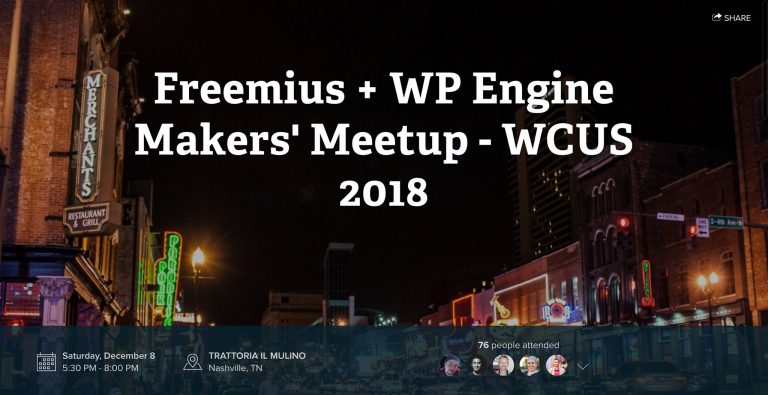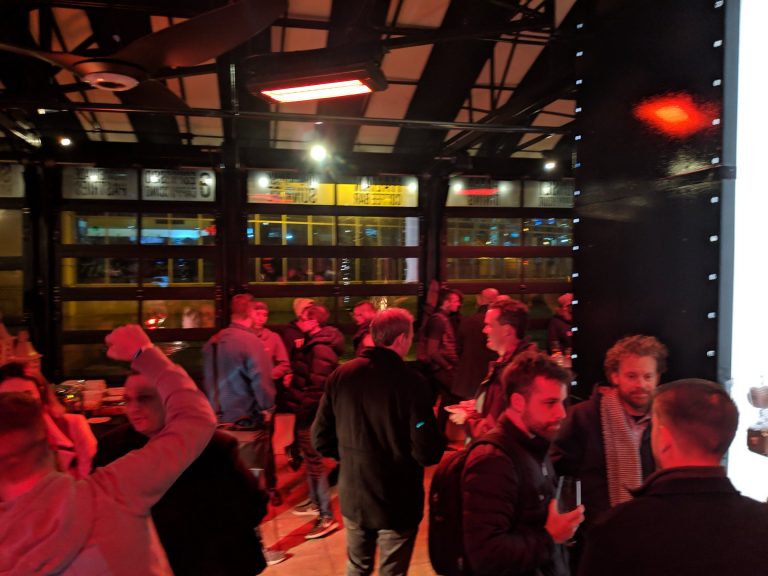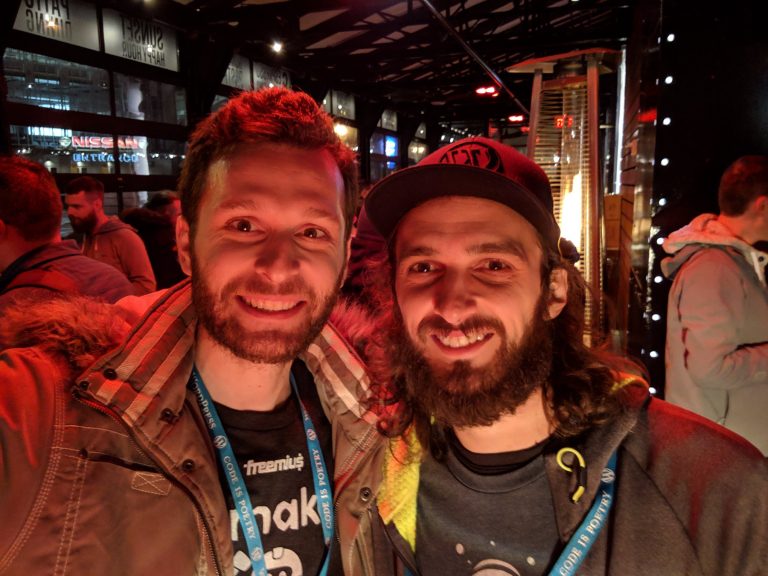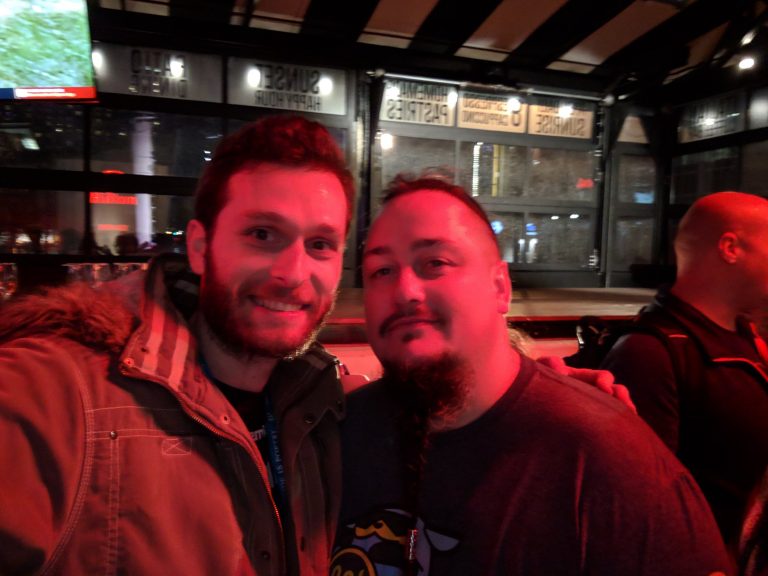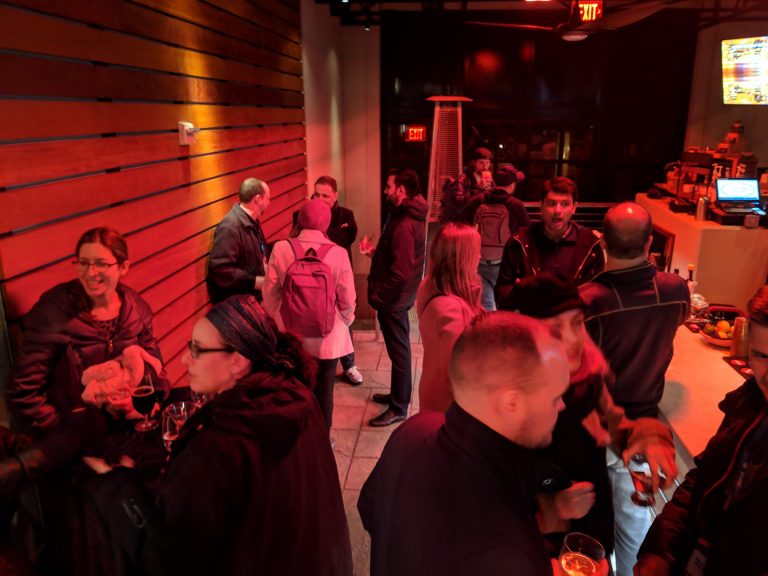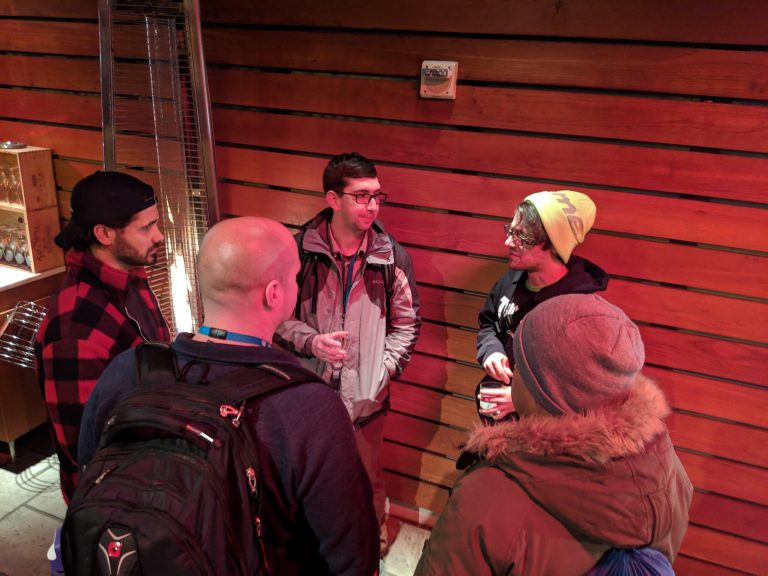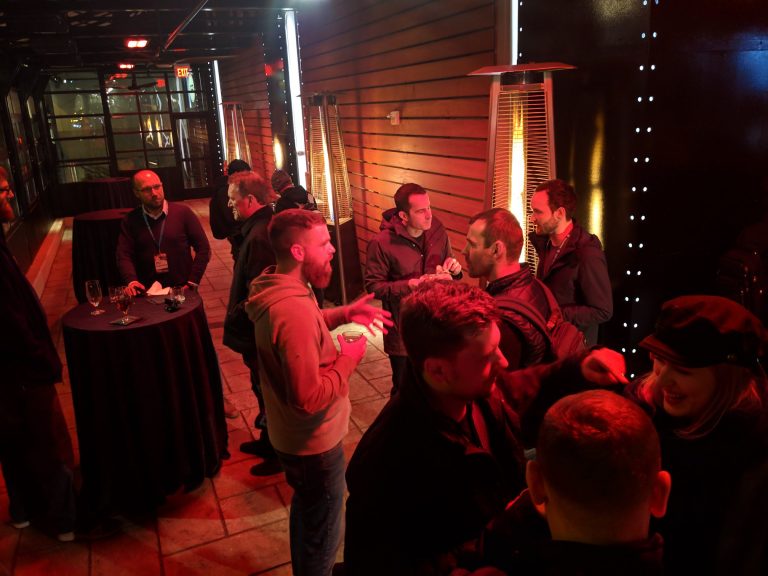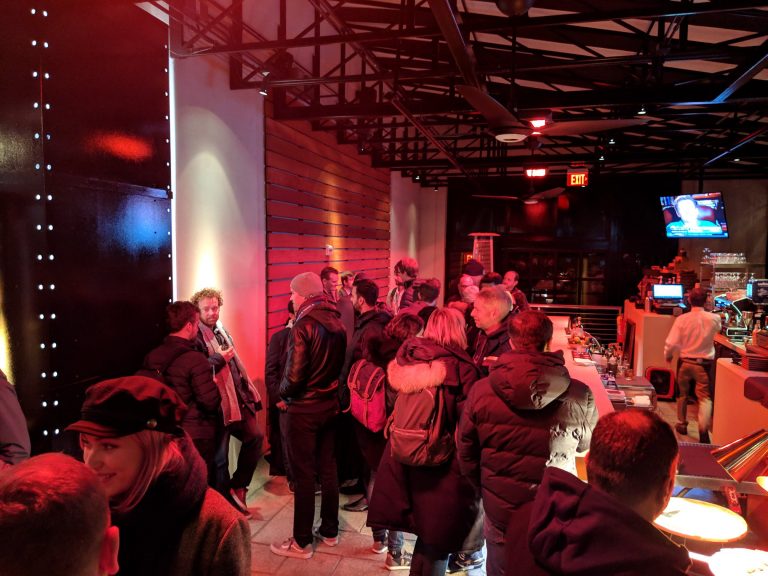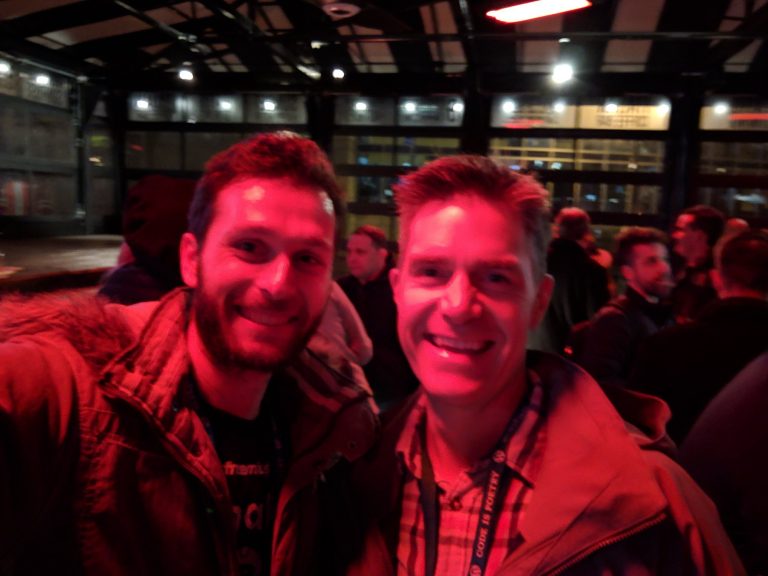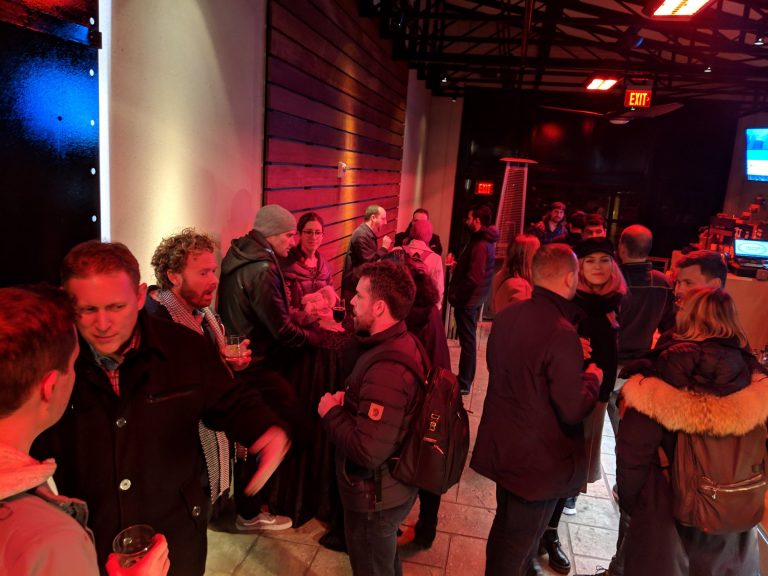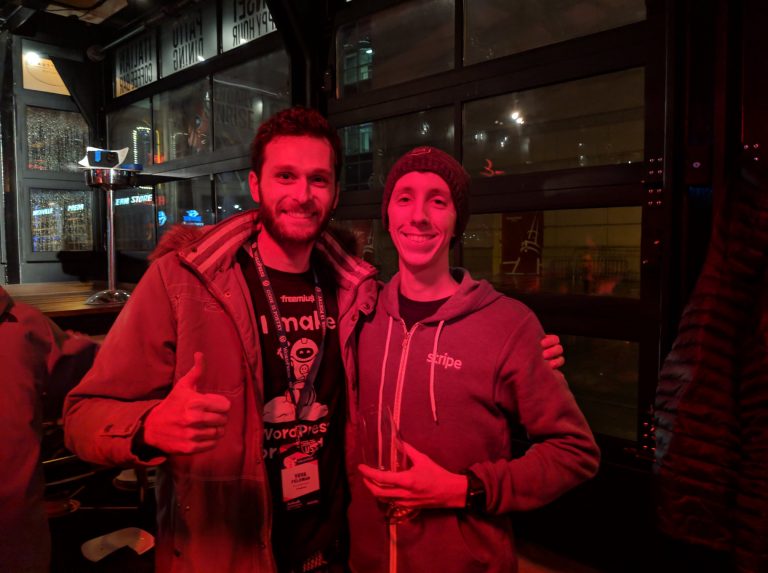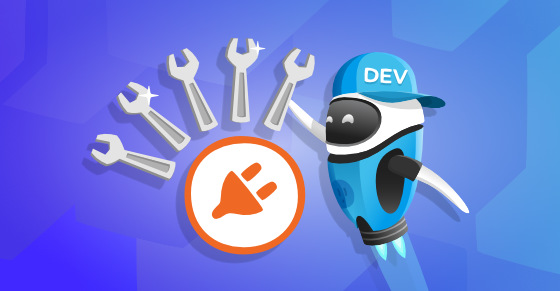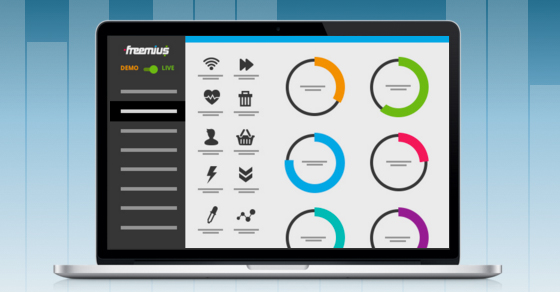|
|
There’s a lot that’s been going on lately in the WordPress sphere, but with WordPress, that would be true no matter when we say it. Nonetheless, I think that many people in the community had a bunch of expectations leading up to WordCamp US 2018 in Nashville. It seemed like many were eager to get several different burning topics clarified for others and for themselves, especially concerning the Gutenberg project and the latest update on its implications on the WordPress business ecosystem.
In this post, I want to provide an inside look into my experience at WordCamp US 2018, as an attendee, as a WordPress enthusiast and a member of the community around it, but most of all, as a WordPress product creator.
In this post, I provide an inside look into my experience at WordCamp US 2018, as an attendee, as a WordPress enthusiast and a member of the community around it, but most of all, as a WordPress product creator
WordCamp US Music City Center #wcus. pic.twitter.com/9SYHQiplWm
— Freemius (@freemius) December 7, 2018
Transitioning From Speed Dating To Relationships (Expanding Your Professional Network)
First off, I’d like to share something personal which I believe those of you who attend many WordCamps can relate to. On the day before the official beginning of WordCamp US 2018, I got back to my Airbnb, and on top of being jet lagged and half asleep I was also disappointed in myself. I was only able to meet and chat with 3 or maybe 5 new people at the speakers & sponsors party. Even though WordCamp hadn’t even officially started and all, I was still giving myself a hard time as I had invested quite a lot of time and money to get there. Obviously, the jet lag didn’t help my feeling 🙂
As an immigrant, I had established a mechanism of constant self-improvement, so it was time to analyze and reflect on what the heck was going on and what should I do to fix it.
After 4.5 years of attending many WordCamps and other WordPress-related events, mainly in the US, attending WordCamp US now feels like one big reunion to me, as I already know so many people in the community. When you are new to a social environment that magical moment when you get to introduce yourself and have the opportunity to share what you’re doing happens multiple times during the event. Looking back at that specific party, I probably knew around 80-90% of the attendees, which doesn’t leave a lot of room for “networking”.
Looking broader, at the general WordCamp, when you know about 20-30% of the crowd at an event with 1,500-2,000 attendees it becomes very hard to expand your network. It’s literally impossible to physically move 20 meters without stopping to say ‘hi’ and catch up with someone you already know. Not only does that take time, but when you meet someone with whom you already have a substantial relationship the conversation is very friendly as well as the energy around it, which I found makes it hard for others to chime in, as it feels too personal.
While I love catching up with my WordPress buddies (many of which became my dear friends over the years), one of the key reasons for flying all the way from Israel to Nashville is to bring in new “business” for Freemius. As a comparison, when I had only started attending WordCamps in the US, I got to meet around 80-120 new people per WordCamp. I’d say that this number probably shrunk by 75% at this point.
Now I notice that when I meet a new product person, I try to get to know them much more in-depth. Instead of hitting them on the head with my “elevator pitch” I now try to learn much more about the person and how I can help them. In other words, instead of “speed dating” I try to build a long-term relationship. In fact, if I could visualize my experience, I think this would be the best way to describe it:
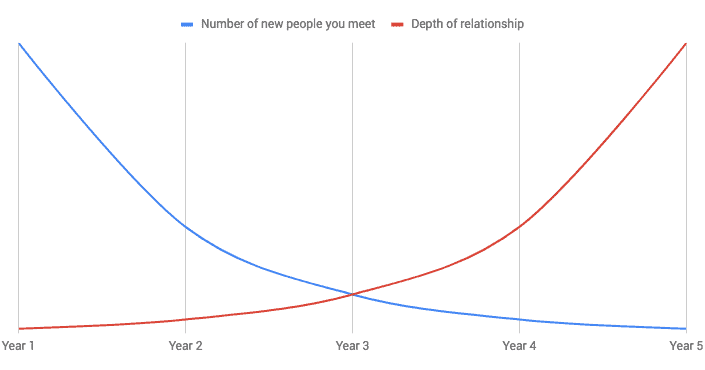
My observation is that the number of new people you meet goes down exponentially, while the level of interaction and depth of conversation and relationships increases in the same manner.
Is that necessarily a bad thing? Not at all. I’m fortunate to be in a position where I personally know most of the US product-people and influencers in the community. It just took me by surprise, and now I need to acknowledge that and adjust to this “new position”.
I’m not planning to stop attending large WordCamps in the US, not at all 🙂 I will say that my goal for 2019 is going to focus more on traveling to international events in Europe and Asia.
Is There A Future For Commercial WordPress Themes With Gutenberg?
As many of you know, the Gutenberg project was, by far, the main focus of WordPress core development. So much so, that they basically froze all new features coming into WordPress core in order to be able to get all of the focus and efforts towards Gutenberg. And so, as expected, this year’s State Of The Word Talk by Matt Mullenweg mostly revolved around Gutenberg and its different development phases (only after about ¾ of the talk does Matt actually refer to the release of WordPress 5.0!).
Matt Mullenweg’s State Of The Word talk was engaging and inspirational, and also slightly controversial, as usual. Matt chose to start off his SOTW with a bunch of interesting, albeit painful to watch, user experience testing highlights inside the WordPress editor. If you’ve ever performed this type of usability testing on your product you know it usually looks and feels like that, and I think Matt hit the nail on its head when he compared it to watching a horror movie and thinking to yourself, as you’re watching the poor character who’s about to get murdered: “No! don’t go in that room…”
Don’t get me wrong, I’m all for usability testing and I think Matt did a fantastic job at presenting us with the problems WordPress users have been experiencing with the editor for over a decade now. What I did find lacking and maybe even irrational was the timing in which he chose to lay down those usability testing for us in order to help “justify” all of the work around the Gutenberg project. Gutenberg is already built into the core of WordPress, but only now the community gets to fully see and realize the reasoning behind it and the necessity that drives it? I think this talk should have taken place about two years ago when they were thinking about starting out a project that would address those issues.
As it looks right now, Gutenberg is going to reinvent themes. Over time, we will transition into a block-templates driven ecosystem. As the new editor is powered by blocks that are based on JS/React, blocks can be easily exported/imported into/from JSON, and Matt actually demoed that during his talk by exporting a certain post layout as a reusable block-template.
Grab a free copy of our Cheat Sheet for
Selling Plugins and Themes
A growth roadmap with concise, actionable tips for every milestone of WordPress product development.

With that in mind, I don’t think that people will stop buying templates/themes though, as I believe many non-tech-savvy users start their website off with a design. As Matt Mullenweg had mentioned, we are going to see vertical/niche based JSON templates.
I don’t think that people will stop buying templates/themes though, as I believe many non-tech-savvy users start their website off with a design.
Since I do not consider myself a themes expert, I reached out to my friend and premium theme shop owner Rich Tabor, who was one of the early adopters of the new editor and actually won Automattic’s Design Award with his Block Gallery project (go Rich!), to get his perspective, and here’s what he had to say:
“There is quite a lot of uncertainty in the air about the future of WordPress themes. Although there will continue to be a need for purposeful design, I see WordPress themes of the future becoming much more of a style framework — than an entire website’s foundation.
With explorations of the second phase of Gutenberg in the works, we’re starting to see how blocks will takeover typically “theme-related” elements; think headers, footers, widget-areas, and even navigational components. With this change, I’m particularly intrigued how themes will interface with WordPress when blocks are not solely tied to content — but to entire site layouts. What an exciting time to be at the forefront of change and evolution!”
Rich Tabor, Owner at ThemeBeans
An Incidental Commercial Gutenbenefit
In his talk, Matt mentioned another incidental benefit that may come out of Gutenberg, and that is the fact that it was designed to be abstracted from the WordPress backend. We can already see some adoption of the block-editor taking place within the Drupal community. This means that, at least potentially, future Gutenberg-based “themes” might work cross-platform and be compliant with other CMS solutions like Drupal. This is exciting because it unlocks an additional market share for theme developers, without any extra coding for the theme, and also because it potentially increases the CLTV (customer lifetime value), as the Drupal ecosystem is much more enterprise-oriented (meaning potential clients have more money to spend).
Future Gutenberg-based themes might work cross-platform and be compliant with other CMS solutions like Drupal, which unlocks an additional market share for theme developers, without any extra coding for the theme
Why Plugin & Theme Developers Ought To Attend WordCamps?
While the majority of people who attend WordCamps are probably not your typical plugin or theme users/customers, there are still so many things that you can get from a conference, no matter the stage your business is at:
- Feel Out The Ecosystem – WordCamps is THE place and gathering where one can get a real chance to “feel out” the WordPress ecosystem, to meet and possibly even chat with the people that truly shape and steer the entire WordPress project. If you consider yourself a WordPress product person or would like to be considered as one, then WordCamps are your opportunity to get in on the action up close and in person.
- Influence The Influencers – WordCamps are usually the best place to start building your relationships with some of the greatest WordPress influencers out there. Influencers enjoy and benefit from their status as influencers just as long as they remain active in the community, and I don’t mean only on Twitter. They are compelled to attend relevant gatherings, thus showing their presence and influence on the ecosystem. WordCamps are usually one of their best shots at doing that and they might actually be hunting for product people they don’t know yet, just like you.
When you have a personal chat with someone that’s considered an influencer in the WordPress community and casually mention your project/product – they are very likely to show interest, and if you do a good job at pitching it to them (even though you’re not actually selling it to them) they’ll remember and will likely recommend it to other people even at that very WordCamp. When someone asks them for a product recommendation in one of their many chats I can guarantee that they will be inclined to mention your product after having met you, simply because that product is owned by someone they had personally met and felt like they had a good connection with. In many cases it doesn’t even matter if they have used the product or not – it’s just our human nature’s tendency to do so.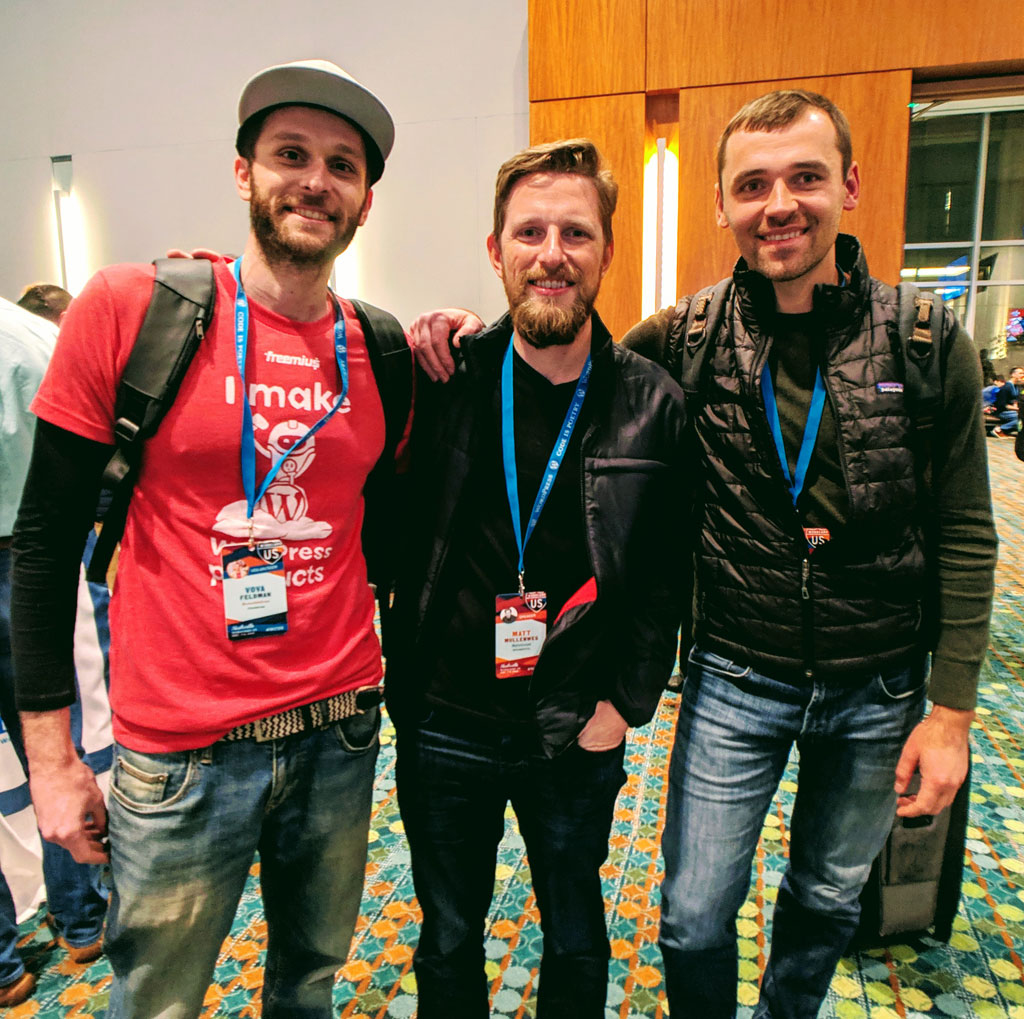
Vova Feldman, Founder & CEO at Freemius, Matt Mullenweg, Founder & CEO at Automattic, Vasyl Martyniuk, Founder at ACM
- Collaborations And Partnerships – WordCamps are usually quite massive in terms of the number of people who attend them, especially when compared with the more laid back and easy going local meetups. In that aspect, they can be great for going after some collaborations and partnerships with the people you meet in them. After you start chatting with some random stranger at a WordCamp hallway, or maybe right in your sit while you’re waiting for the next talk to start off, and find out that person is actually a product person, much like yourself – there are plenty of things you could push for:
- Maybe your products align somehow and you could try to think of a way to commercially collaborate. Even if the products don’t align directly, you could still try to set up some kind of content collaboration – you write a guest post for their blog and vice versa. It’s usually an easy win-win because one side gets nice exposure while the other side gets free (but hopefully high-quality) content to publish for their blog readers.
- Maybe your products complete or supplement each other and it might be worthwhile to do some cross-promotion for both of you? You could push each other’s products to your users (either through a newsletter, a website banner or maybe even directly inside the product if it’s really beneficial for you). You both could potentially be gaining new users out of such a move; users who may never would have heard of you otherwise.
- Even if your products do not seem to natively align or to be completing each other, there could still be ways to collaborate. It is not uncommon now for WordPress plugins to be distributed and pushed into websites through themes. In some cases, it makes sense for a theme owner to incorporate a certain plugin as a built-in functionality for their professional WordPress theme. It can be a win for both parties: the plugin gets distributed to a new audience while saving the theme owner the hassle of building out that new feature from scratch.
- Meet Some Of Your Customers – WordCamps may turn out to be a great opportunity for product owners to meet with some of their customers, especially when we’re talking about the relatively larger events like WordCamp US and WordCamp Europe. If you do meet a customer/user, use the opportunity to buy them a cup of coffee and get their 1:1 user feedback about your product. If they are happy with it, do not hesitate to ask them for a testimonial which you could showcase on your website. Not everyone will agree to be video-recorded, so even agreeing to a written testimonial with their profile photo next to it would be great!
- Learn From Other Product Founders – In the same way that you’re looking to gain and benefit from attending WordCamps – other WordPress product creators are too. That’s why they’ll be easy to find and chat with. Use this opportunity to meet with the founders and c-level executives of the WordPress products that you are using on a day to day basis and try to learn a thing or two about their vision and the way they plan and execute it.
- Meeting Like-minded Product People – Obviously, the people you chat with at a WordCamp don’t have to be founders or executives. Just meeting and chatting with some “regular” like-minded product people, like yourself, can be very satisfying and beneficial for you. You can never know where your next genius idea is going to come from 🙂
I wrote more about this topic more in depth here.
Why You Should Consider Volunteering, As A Product Person?
I have been volunteering in the last three WordCamp US conferences as well as on the last WordCamp Europe in Belgrade, and it was a great decision, so I’d like to share why.

- Give Back – Volunteering at such a big WordCamp event allows you to give back to the community that made WordPress so awesome. This is something that’s much harder to do through smaller teams or when you are an indie developer. This is your once-a-year opportunity to do that.
- Free Ticket – Relatively speaking, WordCamp tickets aren’t pricey at all, when compared with other professional big conferences at that scale. Still, when volunteering you obviously get a free ticket in (and usually also a cool volunteer t-shirt to go with it), so that’s nice.
- Access To The Speakers and Sponsors Party – In addition to a free ticket to the conference you also get a personal invite to the WordCamp Speakers & Sponsors Party, where you’ll be able to schmooze with the top WordPress people in the event and maybe even bring up your product once or twice during the conversations 🙂
- You Can Choose What To Do – When you apply to volunteer at a WordCamp the team of organizers really tries to take your marked preference into consideration as they allocate the different positions to their volunteers. It’s not always a perfect match, but they really try to make it happen for you. So, for example, if you are mostly into listening to talks you can ask to be a mic runner. This’ll keep you up close to the stage so you’re definitely going to be able to focus on those important talks. If you happen to be more into socializing you should mention that in your application form and ask to do something that involves the registration desk or the hallway track.
- Volunteers Are (Great) People Too – With 200+ volunteers at WordCamp US 2018 that is definitely a large enough pool of people to potentially connect with, especially taking into consideration that some of them are WordPress product people, just like you.
Our Annual Freemius + WP Engine Makers’ Meetup
It has become a tradition at this point for us to collaborate with the amazing WP Engine hosting company in organizing a special meetup just for WordPress product makers. The Freemius + WP Engine Makers’ Meetup – WCUS 2018 saw 66 great product people who attended, and I personally got to have some really insightful conversations.
The purpose of these annual events that we’re hosting is to bring like-minded, product people under the same roof, in order to create the perfect conditions for them to be able to make important connections in the industry, share their experiences from their lives as WordPress product makers, create beneficial collaborations with one another, and finally, just converse and learn from each other. Whether you’re using Freemius or any other solution like EDD or even a marketplace like ThemeForest to sell your WordPress products, we all share the same business goals and that’s to learn, improve and grow our product businesses. It is much harder to do that when you’re all on your own, so why not meet and collaborate with like-minded people?
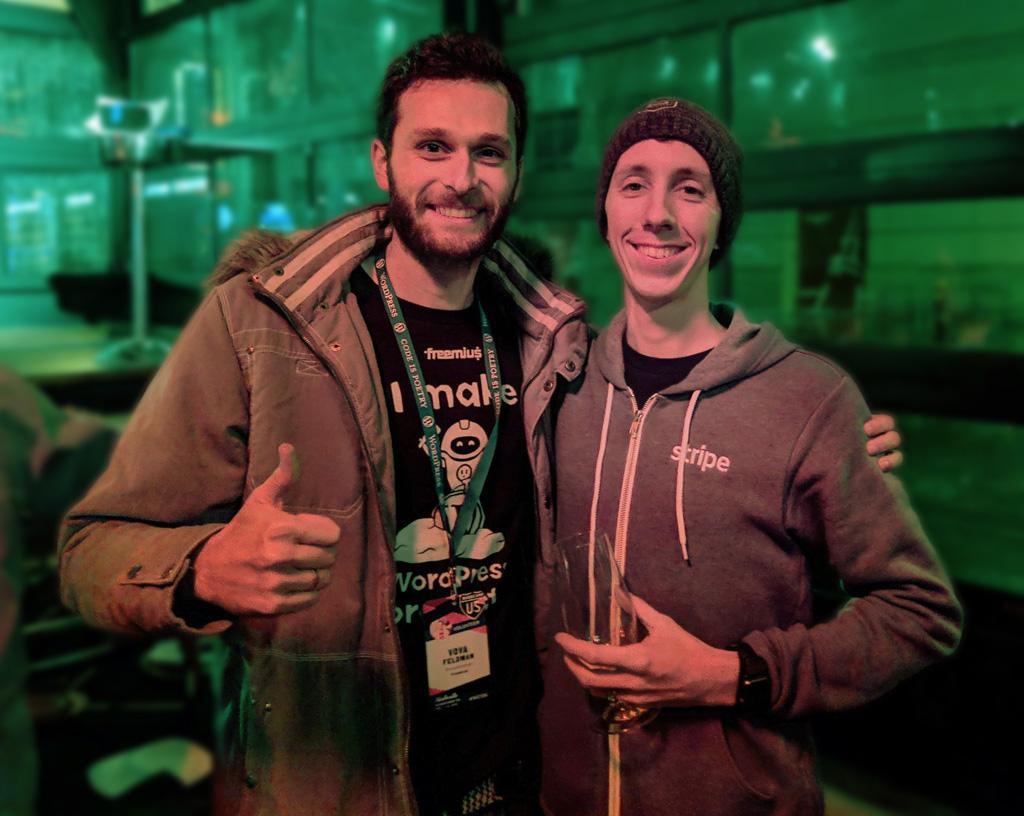
This has actually been the 3rd WordPress product makers event we have co-organized with WP Engine:
But this has been the 1st one we have organized an event together on US soil 🇺🇸
This time around we were actually planning to host up to 50 product people, but due to high demand, we bumped up the registration count up to 80. We had 76 RSVPs. 60 of them showed up, and 6 more came at the last minute without RSVP-ing. That’s a staggering 78.9% attendance rate which proves just how much product people crave to network with other product people (ahem… PressNomics 😉 ).
Here are a few pictures I took at the event. Hope they manage to help you absorb just a little bit of the atmosphere and maybe we’ll even see you with us next time 😉
Recap
Taking everything I had mentioned above regarding WordCamps into account – I am definitely going to WordCamp Berlin in 2019. If you’re planning to also attend – be sure to tap my shoulder and say hi 🙂
And lastly, which international WordCamps would you recommend I go to? As mentioned above, I’m looking to expand my travels to new horizons and would love your recommendations in the comments section below!


